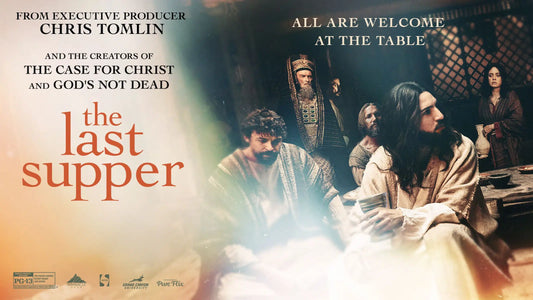📺 Series Overview
✅ Title: House of David
✅ Release Year: 2025
✅ Creators: Jon Erwin, Jon Gunn
✅ Cast: Michael Iskander (David), Ali Suliman (Saul), Stephen Lang (Samuel), Ayelet Zurer (Ahinoam), Indy Lewis (Michal), Ethan Kai (Jonathan), Martyn Ford (Goliath), Sian Webber (Orpah)
✅ Genre: Historical Drama, Faith-Based
✅ Platform: Amazon Prime Video
✅ Episodes Reviewed: 6-8 (March 20–April 3, 2025)
📖 Episodes 6-8 Summary
Following our review of episodes 1-5, episodes 6-8 of Amazon Prime’s House of David propel David toward his destiny. Episode 6, “Giants Awakened” (March 20, 2025), sees David soothing Saul’s tormented spirit with music while Philistine King Achish recruits Goliath and his giant brothers for war. A fictional romance between David and Michal deepens, and Queen Ahinoam consults a spiritist to aid Saul. Episode 7, “David and Goliath - Part 1” (March 27, 2025), builds to war as Saul’s paranoia peaks and David’s faith is tested. The episode emphasizes court tensions and Jonathan’s loyalty. Episode 8, “David and Goliath - Part 2” (April 3, 2025), delivers the climactic battle, with David’s sling felling Goliath, cementing his legend. A fantastical Nephilim backstory unfolds, tying Goliath to angelic origins.
✝️ Biblical Accuracy and Differences
Episodes 6-8 of House of David cover 1 Samuel 16:14-23 and 17:1-58, faithfully depicting key moments but introducing significant creative liberties to expand the narrative. Below are the alignments and deviations from Scripture:
Alignments with Scripture:
- David’s Role as Musician: Episode 6 accurately shows David playing the lyre to ease Saul’s distress caused by an evil spirit (1 Samuel 16:14-23). Michael Iskander’s performance, incorporating Hebrew psalms, enhances authenticity.
- David and Goliath: Episodes 7-8 meticulously recreate the battle (1 Samuel 17:1-58), with David’s faith in God (1 Samuel 17:37, 45) and use of a sling and stone portrayed vividly. Goliath’s challenge for single combat (1 Samuel 17:8-10) mirrors the biblical account.
- Jonathan’s Friendship: Episode 7 captures Jonathan’s covenant with David (1 Samuel 18:1-4), emphasizing their mutual loyalty and emotional bond, consistent with Scripture.
- Goliath’s Description: The series reflects Goliath’s Mycenaean-inspired armor, including bronze greaves and a spear like a weaver’s rod (1 Samuel 17:5-7), aligning with scholarly views of Philistine ties to the Sea Peoples.
Deviations from Scripture:
- Nephilim Backstory: Episodes 6-8 depict Goliath and his brothers as Nephilim, descendants of fallen angels and human women (Genesis 6:1-4), living with their mother, Orpah, in a cave. This draws from the apocryphal Book of Enoch and rabbinic traditions linking Goliath to Orpah (Ruth 1:8-15) but isn’t explicit in 1 Samuel. The Bible connects Goliath to the Anakim giants (Numbers 13:33; Joshua 11:22), but the angelic origin and Orpah’s role are speculative.
- David’s Family and Illegitimacy: The series portrays David as an outcast, labeled a “bastard” by his brothers, with his mother implied to be a Gentile and blamed for her death. This stems from interpretations of Psalms 51:5 and 69:8-12 but lacks direct support in 1 Samuel, which presents David as a favored shepherd.
- Michal’s Romance: Episodes 6-7 show David and Michal’s romance before the Goliath battle, complete with modern romantic dialogue. In Scripture, their relationship begins after David’s victory (1 Samuel 18:20-27), making this a significant timeline shift.
- Ahinoam and Spiritism: Episode 6 expands Ahinoam’s role, depicting her consulting a spiritist, Besai, to heal Saul. While Saul later consults a medium (1 Samuel 28:7-25), this earlier spiritism is fictional and anachronistic, as Ahinoam is barely mentioned in Scripture (1 Samuel 14:50).
- Orpah’s Murder: Episode 6 includes a subplot where Doeg kills Orpah, framing Israel, to secure Goliath’s allegiance. This is entirely invented, as the Bible doesn’t mention Orpah or such a plot.
- Monogamy and Anachronisms: The series portrays Saul as monogamous, ignoring his concubine and multiple wives (2 Samuel 12:8). Settings like Saul’s wooden thrones and modern dialogue (e.g., “run away with me”) introduce anachronisms, clashing with the Bronze Age context.
- Goliath’s Height: The show depicts Goliath as 14 feet tall, far exceeding the biblical range of 6’9” (Dead Sea Scrolls) to 9’9” (Masoretic Text) (1 Samuel 17:4). This exaggeration amplifies the fantastical tone.
The series’ creators consulted scholars and pastors to balance fidelity and drama, but the heavy reliance on non-canonical sources like the Book of Enoch and Jewish midrashim may alienate viewers seeking strict biblical adherence. The disclaimer acknowledges these liberties, yet the fantastical elements can overshadow the scriptural narrative.
🙏 Christian Perspective
From a Christian perspective, episodes 6-8 powerfully highlight David’s faith, especially in “David and Goliath - Part 2,” where his trust in God over human strength (1 Samuel 17:45-47) resonates as a foreshadowing of Christ’s victory. Saul’s pride and disobedience (1 Samuel 15:22-23) contrast with David’s humility, offering lessons on submission to God. The series subtly weaves messianic themes, positioning David as a type of the ultimate Davidic king, Jesus. However, the Nephilim subplot and spiritism introduce speculative theology that may confuse viewers unfamiliar with apocryphal texts. Christians should view the series as a dramatization, not doctrine, using it to spark deeper engagement with 1 Samuel.
🎬 Storytelling & Direction
Jon Erwin and Jon Gunn craft a visually epic saga, with “David and Goliath - Part 2” delivering a gripping climax using forced perspective for Goliath’s stature. Filmed in Greece and Alberta, the series’ landscapes evoke ancient Israel, though pacing in “Giants Awakened” lags due to dense subplots. The Nephilim flashback, inspired by the Book of Enoch, adds a fantastical flair but risks diluting the biblical focus. Some other reviews praise the ambition but note uneven scripting and an anticlimactic feel in episode 7’s buildup.
🎭 Performances
Michael Iskander’s David radiates faith and vulnerability, particularly in musical scenes and the Goliath confrontation. Ali Suliman’s Saul is a tragic, paranoid figure, while Ethan Kai’s Jonathan brings warmth to the friendship arc. Ayelet Zurer’s Ahinoam and Indy Lewis’ Michal add emotional depth, though their expanded roles feel forced. Martyn Ford’s Goliath is physically imposing, but his mythical backstory overshadows his menace. Stephen Lang’s Samuel anchors the spiritual narrative with gravitas.
🎨 Production Quality
Shot in Greece’s Saronikos cliffs and Alberta’s fields, the series boasts stunning cinematography and authentic costumes, though wooden thrones and modern dialogue jar historically. The Hebrew-infused soundtrack and detailed sets immerse viewers, but limited action scenes suggest budget constraints. The Goliath battle’s visual effects are a highlight, earning praise for scale.
✅ Strengths for Christian Audiences
✅ David’s faith and God’s sovereignty shine in the Goliath battle, inspiring trust in divine power.
✅ Saul’s fall and David’s rise teach humility and obedience, relevant to Christian living.
✅ High production values make the biblical world vivid and engaging.
❌ Critiques & Shortcomings
❌ Non-biblical subplots, like Nephilim lore and Orpah’s murder, may distract from Scripture.
❌ Anachronisms and fictional romances introduce historical inaccuracies.
❌ Pacing issues in episode 6 and underdeveloped subplots lessen emotional impact.
📢 Final Verdict
⭐ 7.5/10 – House of David episodes 6-8 (“Giants Awakened,” “David and Goliath - Part 1,” “David and Goliath - Part 2”) deliver a visually stunning and faith-affirming saga, with David’s victory over Goliath a powerful testament to God’s strength. Strong performances and production elevate the series, but extra-biblical elements like Nephilim lore and fictional subplots require discernment. Christians will find inspiration but should pair viewing with Scripture study to separate fact from fiction.









